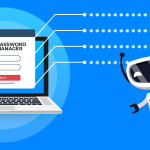Table of Contents
What is Cybersecurity?
Back then, the world was safer as cyber issues like internet security threats were minimal. The story has now changed due to the massive advance in technology. Do we then say technological growth is harmful? We can’t exactly say so. We should only blame the bad actors in cyberspace.
A cybersecurity statistics report by PurpleSec shows that 71.1 million people fall victim to cybercrimes yearly. This report is a heart-shattering fact. Therefore, this blog post is designed to provide you with all the pieces of information you need to stay ahead of cybercriminals. So let’s get to it.
Meaning of Cybersecurity
Cybersecurity means protecting your systems, networks, databases, servers, etc., from cyber-attacks through certain technologies.
In short, these technologies guard sensitive data stored on your databases or systems from theft or loss. They also protect your network from intrusion and save your devices from malware.
Types of Cybersecurity
Cybersecurity is all-encompassing. It has numerous branches, just as there are different network security threats, internet security threats, etc. Therefore, we shall discuss its five significant types.
-
Network security
Network security addresses the blocking away of anomalies from permeating your network or operating system. It is a bridge between your network and the world.
A network security measure sees that your network is guarded 24/7 so that it is up and running at all times. Examples of tools used to achieve this purpose are firewalls and anti-virus software.
-
Application security
It shows from the name that application security protects software, application, and devices from cybersecurity risks. It also prevents loopholes when developing and testing an application’s security features.
-
Information security
Often, people confuse information security with cybersecurity. Even though they both focus on security, they are not the same. One might then ask, “What is information security?”
Information security (InfoSec) is keeping information or data secure. When stored or transferred, it protects data in all forms – digital, print, or others. The basic principles of InfoSec are summarized as CIA (Confidentiality, Integrity, and Availability).
To achieve uncompromised information security, you need an ISP (Information Security Plan). An ISP documents a company’s plans and measures to protect its sensitive information.
-
Disaster recovery/Business continuity
This concerns how an organization responds to a cyber-attack or other kinds of unplanned incidents. Similarly, business continuity is an organization’s plan to return to business after experiencing an attack.
-
Infrastructure security
Infrastructure security protects an organization’s infrastructure. These infrastructures include IT, network communications, data centre, etc. Other infrastructures which are not entirely IT-related are water supply, cooling system, and power supply.
Read also: Effective Ways to Improve Cyber Security for Nigerians
Importance of Cybersecurity
-
Prevents data loss
Data is precious to organizations and those launching internet security threats and other threats. Therefore, cybersecurity ensures that the data your company owns is safe and inaccessible to cybercriminals to steal.
-
Trust building
Many other organizations offer the same services as you. These organizations are also hustling for the same set of customers that you are looking to attract. However, to help these prospective customers trust you with their data, they must rest assured that the data will be safe.
If your business has suffered a cyber attack in the past, these potential buyers will doubt you. But, on the contrary, if you have an impenetrable cybersecurity plan, your existing and potential customers will easily trust you.
Read also: The Useful Tips You Need as a UX Designer in Artificial Intelligence
-
Avoids financial loss
Cybersecurity saves you from losing money twofold – the amount you already have and the amount it will take to resolve an attack. For instance, research shows that resolving a malware attack will cost a company more than $2.5 million.
This means that after a company has lost money to an attack, it will lose more to resolve it. This situation can take a company out of business.
Types of Cybersecurity Threats
As internet security threats are part of cybersecurity, we shall list a few common to both.
- Malware
- Phishing
- DoS/DDoS
- Botnets
- Rootkit
- SQL Injection
- Session Hijacking
- Ransomware
- Brute Force Attack
- Adware
Perhaps this post inspires you, kindly follow our Instagram page to keep track of more interesting posts. You can also subscribe to our newsletter. Insight.ng has always got your back. Thanks for your time!
How to Protect yourself from Cybersecurity Threats
Here we shall discuss internet security measures that you must take to protect your business from cybersecurity risks.
-
Don’t click or download
Internet security threats often launch successfully by clicking malicious links or downloading malicious attachments. So, to stay safe, desist from interacting with links or attachments from unknown sources as they often carry malware.
-
Use anti-virus software
An anti-virus is designed to keep your systems and computers free from malicious software. If malware gets into your computer, anti-virus software can also remove it.
-
Update software regularly
Ensure to update all software regularly. Waiting for a long time before making updates is detrimental to your business. In addition, once you update your software, you have access to additional features and tighter security from internet security threats.
-
Patronize trusted sources
The market is saturated with various sellers of software and apps. Nevertheless, you can still successfully select the right company to buy your software from.
When making a software choice, always buy from the big guns in the industry. These companies know the various internet security threats that exist. Therefore, they build software and apps to combat these cybersecurity risks and threats.
-
Create complex passwords
The world has become more unsafe than it used to be. So creating passwords that hackers can easily guess is a no-no. Instead, ensure to create a password that has at least eight characters.
You could combine upper cases, lower cases, and symbols. Do not use your name, home address, or pet’s name.
Conclusion
Cybersecurity is integral to running a business. It should not be an afterthought in your organization. Ensure a cybersecurity plan from the moment you begin setting up your business. It will help your business stay secure from cybersecurity/internet security threats.
Do you have any contributions? Kindly add them below.
You can also have an audience with Insight.ng via our WhatsApp community as regards technology.
We’ll be glad to learn from you too.
About Author
- Oluwatosin Ajayi studied Mass Communication in Adekunle Ajasin University. She has a flair for content writing in cybersecurity. Her journalism experience helps her to research topics in-depth. She then uses her communication skills to pass across facts in digestible forms. Oluwatosin also writes fiction in her leisure time.
Latest entries
 LifestyleApril 15, 202410 Tips on How to have Fun during Traffic Congestion in Nigeria
LifestyleApril 15, 202410 Tips on How to have Fun during Traffic Congestion in Nigeria TechnologyNovember 27, 2022The Best Password Managers: Pros, Cons, and Pricing
TechnologyNovember 27, 2022The Best Password Managers: Pros, Cons, and Pricing SpiceNovember 14, 202210 Tips on How to have Fun during Traffic Congestion in Nigeria
SpiceNovember 14, 202210 Tips on How to have Fun during Traffic Congestion in Nigeria TechnologyOctober 30, 2022A Step-by-Step Guide on How to make Money in Tech
TechnologyOctober 30, 2022A Step-by-Step Guide on How to make Money in Tech

